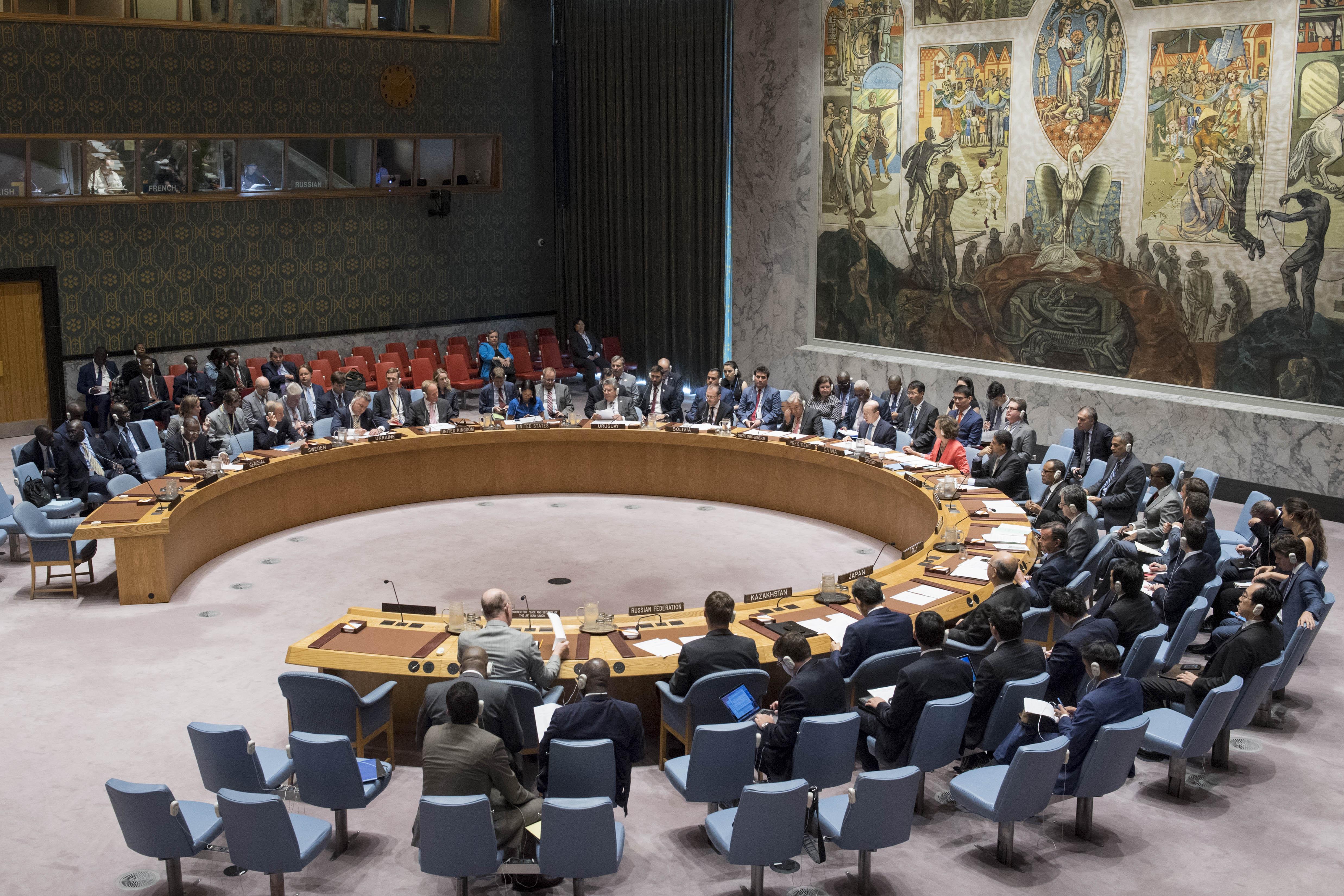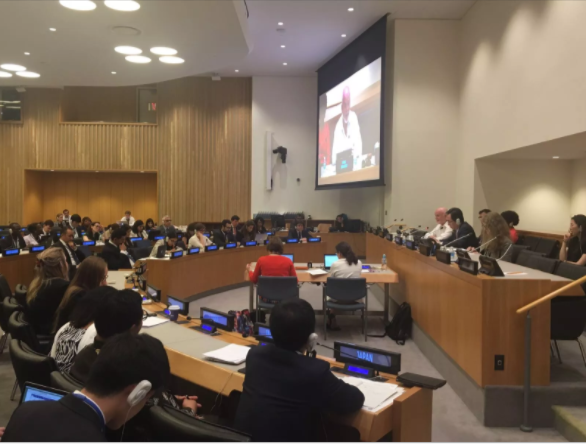Women, Peace and Security E-News July 2017

Editorial: What Will the 2030 Agenda Accomplish for Women in Conflict?: Policy Coherence and Extraterritorial Accountability as Key Requirements
By Gabriella Irsten, Policy and Advocacy Officer of WILPF Sweden
false
Gabriella Irsten (right) and Elin Liss (left) of WILPF Sweden met with a Permanent Mission of Sweden representative to present the policy paper entitled, “How Feminist is Sweden's Foreign Policy?” (Photo: WILPF Sweden)
At last week’s High-Level Political Forum (HLPF) on the Sustainable Development Goals (SDGs) and the 2030 Agenda, the Irish ambassador commented: “Improving the lives of women is the litmus test of all the 2030 Agenda”.
But what about women in situations of conflict? The impact on them is a critical part of this test.
Women have demanded and fought for inclusion in peace and political processes for a long time. Today, to some extent, the international community has managed to adapt legal frameworks that support women’s participation and rights at the international level. But women are still missing from peace negotiations and political discussions about their future and their societies’ future.
The 2015 SDGs and 2030 Agenda provide a set of tools that have the potential to orient action by the United Nations, Member States and even International Financial Institutions (IFIs) to prioritise and invest in gender equality and feminist peace and move past the long-standing obstacles of political apathy, gender blindness and miniscule funding streams.
As part of WILPF Sweden’s national work, I attended the HLPF on the SDGs last week, where Sweden presented its first Voluntary National Review (VNR).
WILPF Sweden’s work focuses on many of the agenda’s goals and targets. One important target is 17.14, which calls for comprehensive policies. We utilise the SDG commitment to leaving no one behind and promoting policy coherence to strengthen advocacy on restricting arms exports to countries that discriminate against women and addressing immigration and asylum policy.
We need to address many aspects of women’s rights by eschewing the artificial compartmentalisation of human rights, political participation, disarmament, justice and development.
WILPF´s approach is rooted in the belief that violence should not continue to be employed as a means of conflict resolution and that coherent and practical alternatives to military action must be developed to prevent, manage and resolve conflict. This approach goes well with the 2030 Agenda, which is constructed in a way that the goals and targets are interlinked and “no one is left behind”. If implemented and applied in good faith, the Agenda could be the golden ticket for sustainable development and feminist peace. It could also work as an umbrella for the tools we already have, including the Women, Peace and Security Agenda, the Commission on the Status of Women and the Convention on the Elimination of all Forms of Discrimination Against Women. And it could collect different aspects of these tools and foster holistic implementation.
In order to implement the Agenda 2030 properly, it is important that countries apply it holistically and take action both within their countries and outside of them to address extraterritorial obligations on women’s human rights. Sweden and other arms exporters need to stop profiting from the arms trade and start applying the Agenda comprehensively.
As the Irish ambassador said, “Improving lives of women is the litmus test of all the 2030 Agenda”. Impact on women in conflict is a critical part of this test.
SDGs for Peace: Leveraging the HLPF Process to Feature Local Women's Peace Work
Participants and panellists of the 2017 HLPF side-event entitled, “From Shrinking Spaces to Feminist Movement Building: Key Priorities on SDG 5 and 16 for Sustaining Peace” (Photo: Alexandra Rojas)
The Second High-Level Political Forum (2017 HLPF) was convened at the time when the aspirations of the SDGs are on the rise but the current climate of violence, patriarchy and political economies of war increasingly restricts women’s meaningful participation and creates structural barriers to the effective SDG implementation.
As part of our work to strengthen conflict prevention and promote accountability on gender equality and peace, WILPF’s Women, Peace and Security Programme monitored the forum for gender and conflict issues, mobilised action, through its outreach strategy and in coalition with Women’s Major Group, to promote implementation of the SDGs in a way that ensures women’s meaningful participation and provides local women with opportunities for concrete action.
We have made our message loud and clear: The SDGs can only be successful only if structural barriers, including gendered inequalities and militarisation, are addressed for every person everywhere, including for women in conflict areas.
As a result of our monitoring and dialogue with peace activists and feminist leaders, including during the Pre-HLPF webinar and the HLPF side-event co-sponsored by WILPF, we have identified several opportunities for further leveraging SDG action for gender equality and feminist peace.
As a peace activist, you can
- Build inclusive national and regional participatory mechanisms for the SDG implementation;
- Utilise other UN processes, including the UPR review and the CEDAW Committee’s work, to strengthen the SDG Implementation;
- Sensitise local population about the 2030 Agenda through media and academia;
- Call for policy coherence on national implementation based on women's human rights standards that address extraterritorial accountability for spillover effects around goal interactions;
- Expose the long-term impact of working with corporations and big for-profit companies on the SDG implementation on human rights and freedoms.
The key to realising the SDGs is to empower feminist movements and build human rights accountability globally. Together, we will continue to work in solidarity with activists and partners everywhere for a world with a deeply rooted feminist vision for a broad impact.
Join the movement! Through ties of sisterhood and solidarity, we can weave the fabric of a more just and feminist peace.
Find more information about WILPF’s engagement at the 2017 High-Level Political Forum here>>>
Security Council Dialogue: Enhancing African Peacebuilding Capacities
By Anne Lescure
A wide view of the Security Council open debate on “Enhancing African capacities in the areas of peace and security" (Photo: UN Photo/Mark Garten)
On 19 July 2017 the Security Council open debate under the theme, “Enhancing African Capabilities in the Area of Peace and Security” was convened by the Council’s current president, China. This meeting was framed as an opportunity to discuss policies and procedures that can provide concrete and effective support for strengthening the capacities of African countries in the field of peace and security. The speakers specifically discussed ways to reinforce the potential of the Joint United Nations-African Union Framework for an Enhanced Partnership in Peace and Security, signed on 19 April 2017.
Robust partnerships, coupled with increased financial and technical support for the African Union-led peace operations and a focus on the implementation of the WPS Agenda were outlined as decisive steps to strengthening the platform of cooperation between the United Nations (UN) and the African Union (AU). Several speakers specifically underlined the need for all steps of cooperation networks to be gender-sensitive as including women in the search for peace and security is “paramount to prosperity and development”.
Read WILPF’s full analysis of the UN Security Council open debate here>>>
Mobilising Financing for Peace: Inside the 2017 PBC Annual Session
By Marina Kumskova
The Peacebuilding Commission held on 30 June 2017 brought UN representatives, IFIs and civil society organisations together to plan partnerships for peace (Photo: UN)
On 30 June 2017 the UN Peacebuilding Commission hosted its Annual Session with a specific focus on partnerships for financing for peace. The meeting provided an opportunity for the United Nations (UN) representatives, international financial institutions (IFIs) and civil society organisations, among others, to explore options for building strategic partnerships, including for resource mobilisation, to ensure an integrated approach to local peacebuilding and sustainable peace.
The role of women in peacebuilding was a recurring topic throughout different break-down sessions, with the recognition of the progress made by the UN and Member States in financing gender-responsive peacebuilding and several calls to foster equal participation of women’s local organisations in existing and newly-developed peace efforts. However, as reiterated by Abigail Ruane, WILPF’s Women, Peace and Security Programme Director, many existing commitments on gender equality in peace work have not translated into practice yet. In this vein, she called on donors to ensure that gender strategies are developed and implemented in partnership with civil society and ensure that investments and partnerships strengthen, rather than rollback, on women’s human rights.
Read WILPF’s summary of the 2017 Peacebuilding Commission Annual Session here>>>
Read the First Intervention by Abigail Ruane of the Women’s International League for Peace and Freedom (WILPF) to the Peacebuilding Commission here>>>
Read the Second Intervention by Abigail Ruane of the Women’s International League for Peace and Freedom (WILPF) to the Peacebuilding Commission here>>>



WILPF Initiatives
Reports, Resources & Policy Briefs
External Initiatives